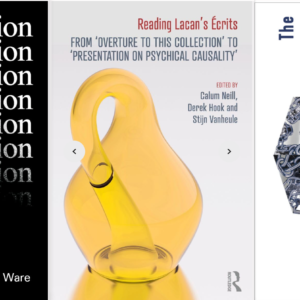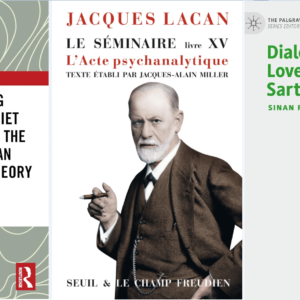News – August 2019
LacanOnline visitors get 20% off and free global shipping on all Routledge titles. Use this link and the discount code on that page at the checkout.
Starting with the latest new book publications, August saw the release of the English translation of Pierre Bruno’s Lacan and Marx: The Invention of the Symptom, courtesy of the Centre for Freudian Analysis and Research Library. Contrary to previous readings of Lacan with Marx, Bruno charts the history of Lacan’s engagement with this giant of political thought, examining Lacan’s premise in the 1960s that Marx “invented the symptom” and how the latter’s thought informed Lacan’s thinking on the capitalist discourse, and his relation with contemporaries such as Althusser, Deleuze, Guattari, and later Zizek.
Torgeir Fjeld’s book on Lacan and the philosophy of psychoanalysis, Perversion’s Beyond, was released by Atropos Press on 1st September. Perversion of justice, sexual perversion, perversion of tradition… Fjeld argues that the pervert has become the figure that most essentially captures what it means to live in our age. Perversion’s Beyond advocates a stricter definition of the pervert than Freud’s well-known formulation: it suggests that we should adopt the pervert as a homeostatic device; that innovation today entails perversion. It is available from Amazon and more can be found on the author’s site.
In October Thames & Hudson will publish Francis Bacon: Painting, Philosophy, Psychoanalysis, edited by Ben Ware. This text goes beyond established readings of Bacon with a groundbreaking collection of essays by some of today’s most prominent philosophers and psychoanalytic critics:
- Bacon’s Cynegetic Vision – Howard Caygill, Professor of Modern European Philosophy in the Centre for Research in Modern European Philosophy at Kingston University
- Scratching the Surface: Distance and Intimacy in Study of Henrietta Moraes Laughing – Gregg Horowitz, Emeritus Professor of Philosophy at Pratt Institute in Brooklyn, New York City
- Revisiting the Mirror Phase – Darian Leader, Psychoanalyst and Member of the Centre for Freudian Analysis and Research and of the College of Psychoanalysts
- From Deconstruction to Plasticity: Morphing Francis Bacon – Catherine Malabou, Professor of Philosophy at the Centre for Research in Modern European Philosophy at Kingston University
- From Sense to Sensation: Bacon, Pasting Paint and the Futility of Lacanian Psychoanalysis – Dany Nobus, Professor of Psychoanalytic Psychology at Brunel University, and Former Chair of the Freud Museum
- The Imposture of the Self Portrait – Renata Salecl, Professor of Psychology, Psychoanalysis and Law at Birkbeck College, University of London
- Looking the Negative in the Face: Modernist Painting after Affect – Ben Ware, Co-Director of the Centre for Philosophy and Visual Arts, King’s College, London
- Bacon and the Art of Objective Humour – Alenka Zupancic, Senior Researcher at the Institute of Philosophy, Slovene Academy of Sciences
Bacon’s work is brought into dialogue with a range of figures, including Hegel, Kant, Freud, Lacan, Heidegger and Deleuze and is situated in the broader cultural contexts of modernism and modernity.
Knots: Post-Lacanian Psychoanalysis, Literature and Film, edited by Jean-Michel Rabaté, is set for publication at the end of November by Routledge. It comprises a collection of new essays engaging with several domains impacted by Lacanian theory. As well as film and literature indicated in the title, queer studies, post-colonial studies, feminism, and deconstruction are considered. An international group of scholars provide contributions which have been specially commissioned for this edition. It is available to pre-order now, through Amazon or from the publishers Routledge at a discount using the code at the top of this page.
December sees the publication of two close critical readings of difficult Lacanian topics. Firstly, Guy Le Gaufey’s Lacan and the Formulas of Sexuation, again from publishers Routledge, examines the logical consistency and clinical consequences of Lacan’s work on sexuation of the early-to-late 1970s. The book argues for how the formulae should be read in relation to the Aristotelian tradition of logic on one hand, and Klein’s theories of the ‘part object’ on the other.
Secondly in December, Carol Owens’ and Stephanie Swales’ Psychoanalysing Ambivalence with Freud and Lacan: On and Off the Couch delivers a meditation on ambivalence which argues for the need to recognise that “we love where we hate and we hate where we love”. A true lesson of Freudianism which seems very alien in our times, this thesis is supported by the argument that “to be in two minds about something or someone is characteristic of human subjectivity”. The authors also extend Lacan’s thinking on the nature of racism by arguing that ambivalence about our own jouissance is at the roots of xenophobia.
Finally among new books, last month brought news that Palgrave are in production with Reading Lacan’s Seminar VIII: On Transference, part of the Palgrave Lacan Series. Due for release early next year, it will provide 18 lively commentaries on Lacan’s 1960-61 Seminar exploring its theoretical and philosophical consequences in the clinic, the classroom, and society. Some chapters closely follow the structure of the seminar’s sessions, while others take up thematic concerns or related sessions. Watch this space for further updates.
Among events, in Manchester, UK the Northwest Regional Psychotherapy Association (NWRPA) has a number of upcoming events which feature Lacanian speakers and topics – flyer here. On Fri 13th September, Mark Fisher will present ‘Where Does it Hurt? Pain and its Killing’, addressing the nature of pain in the context of the prescription opioid crisis afflicting the US and Britain at present. This will be followed by Julia Evans’ talk on Fri 11th October (title to be announced), and Jo Rostron’s on Fri 8th November titled ‘Bodies and Books: An Art Therapist’s Reading of Lacan’. Full details are on the NWRPA’s events page.
An ‘Introduction to the Lacanian Clinics of Psychosis’, a six-seminar course from the London Society of the NLS, has been announced with a start date of 12th October, running up to 11th July next year. It will introduce the concept of foreclosure through Lacan’s innovative readings of the Wolf Man and Schreber cases (two of the most famous from Freud’s canon) and follow the development of Lacan’s thinking up to his engagement with Joyce and the elaboration of the Borromean clinic centred on the sinthome in the late 1970s. For more information see the LS-NLS’s site with the full programme for the 2019-2019 year, which includes sessions on Pass Testimonies, Cartel Study Days, and Knottings Seminars. The site also has reports, audio, and texts from its previous events that are worth checking out.
In the US, Lacanian Compass is running a series of events in readiness for the Clinical Study Days 13 on ‘Jouissance: The stuff that dreams are made of’, which will take place in New York City 21st-23rd February 2020. On 4th Oct in NYC, a screening and discussion of Marcelo Veras’ film ‘The Madness Among Us’ – based on his time as a director of a psychiatric institution in Salvador, Brazil – will be followed on 5th Oct by a lecture by Veras and clinical case presentation by Azeen Khan. More details of all upcoming events on the group’s page here.
The Irish Circle of the Lacanian Orientation has announced its programme and calendar of events for the 2019/2020 year. Opening with ‘Art and Psychoanalysis: Possibilities and Politics’, it will continue throughout the year to consider dreams, the endings of an analysis, and of course the subject of next year’s NLS Congress, ‘Interpretation From Truth to Event’.
The Lacan Circle of Australia has a special Study Day on 21st September, devoted to ‘Mothers’. Maternity and the maternal status will be discussed in relation to the infant-mother relationship (Russell Grigg); the intergenerational effects of the Holocaust as transmitted through the mother-daughter relationship (Vicki Halik); the contemporary mother (Eugenie Austin); and the ‘Two Mothers’ (Alison Ravenscroft). The event takes place in Carlton, Victoria but is also open to attend via Zoom.
Finally, Jamieson Webster’s article for the New York Review of Books last month, ‘Riding in Cars with Jacques Lacan’, examines the intriguing history of Lacan’s fascination with automobiles and driving. Ranging from Lacan’s account to Catherine Millot of the subject’s appearance in his analysis with Lowenstein; to the unfortunate death of the man Lacan labelled his ‘mortal enemy’ in a car crash; and of course to the tragic death of Lacan’s eldest daughter, Caroline, at the hands of a drunk driver, Webster makes a compelling case for how these subjects were entwined with Lacan’s own character, foibles, and destiny. Worth a read.
Got news? Get in touch.




Leave a Reply